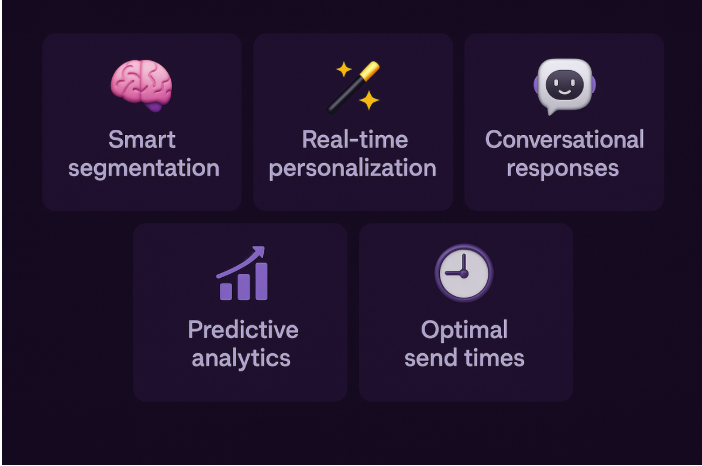
AI has quietly revolutionized digital marketing, and its impact on messaging is becoming impossible to ignore. We see its impacts everywhere, from real-time personalization to predictive analytics-
To put it simply, the latest artificial intelligence advancements are fully reshaping how businesses connect with customers through SMS and WhatsApp.
If you're running messaging campaigns and not using AI yet, you're missing out on massive efficiency gains and engagement opportunities.
The Role of AI in Messaging: Why It Matters
Traditional SMS and WhatsApp marketing often rely on basic automation: sending pre-scheduled messages or simple broadcast blasts.
While this might check the box for outreach, it rarely delivers meaningful engagement. AI, however, changes the game.
What Can AI Actually Do in SMS and WhatsApp Marketing?

AI brings capabilities that go far beyond static scheduling:
- Smart segmentation: AI analyzes behavior, preferences, and past interactions to group users more effectively.
- Real-time personalization: Tailor messages with dynamic content based on user profiles or real-time context.
- Conversational responses: AI-powered chatbots can respond instantly to customer inquiries.
- Predictive analytics: Forecast which customers are more likely to convert, churn, or re-engage.
- Optimal send times: Machine learning determines the best time to message each user based on individual patterns.
AI for SMS marketing and AI for WhatsApp marketing are no longer experimental - they're proven tools for brands that want to compete seriously in direct messaging.
Bringing SMS Marketing Campaigns to the Next Level with AI
SMS remains one of the most direct and effective communication channels, having a 98% open rate. Yet many SMS marketing campaigns suffer from generic, poorly timed, or irrelevant messages.
Here’s how AI turns that around:
Personalization at Scale
AI can instantly customize an AI text message for SMS marketing based on:
- Purchase history
- Geographic location
- Time of day or user activity
- Language or tone preferences
For example, a clothing retailer can send different product recommendations to users in cold climates vs. warm ones, all automatically, without manual list-sorting.

Conversational SMS
Natural language processing (NLP) allows AI to power SMS chatbots that feel almost human. These bots can go far beyond basic auto-replies. They can understand intent, carry context from earlier conversations, and tailor responses in real time.
For example, if a customer texts a question about a product they previously viewed, an AI-powered bot can reference that product directly, offer a discount, and even walk them through checkout.
These bots can also manage appointment reminders, order updates, and delivery confirmations. Most importantly, they respond instantly, day or night, eliminating delays that cost conversions.
Insight from the Experts You Probably Didn’t Know
A high-performing AI text message for SMS marketing, apart from including the user’s name, also adapts the offer based on what stage they’re at in the customer journey.
Let’s take, as an example, a new subscriber who will receive an introductory offer, while a returning customer gets a loyalty reward. You can set up lifecycle-based triggers to unlock deeper personalization: cart abandonment prompts, follow-ups after purchases, or re-engagement nudges after periods of inactivity.
In order to achieve this, you can use segmentation data, purchase history, and engagement patterns to adjust the message tone and urgency. This kind of dynamic targeting makes messages feel timely and relevant, not generic.
Transforming WhatsApp Marketing with AI

WhatsApp is quickly becoming a go-to channel for direct communication, especially in regions where it outpaces email.
But WhatsApp’s user expectations are high: interactions must feel real, relevant, and fast.
How AI Fits In
Using AI for WhatsApp marketing gives you an opportunity to bring some features to the table that are otherwise impossible to scale:
- Dynamic message trees: Automatically lead users through decision paths based on their responses.
- Intent recognition: AI can detect the intent behind open-text responses, directing users to the right content or offer.
- Multi-language support: AI tools can detect language and respond accordingly, making your campaign instantly global.
These capabilities are key for running successful WhatsApp marketing campaigns without overloading your customer support team.
How to Text AI on WhatsApp
Some brands are now offering users the ability to interact with AI directly through WhatsApp. These aren’t just passive bots; they can:
- Answer detailed questions
- Make personalized product suggestions
- Complete transactions or bookings
So, it’s clear that learning how to text AI on WhatsApp opens up new levels of engagement, especially for younger demographics accustomed to chat-based experiences.
How to Install AI in WhatsApp
To get the maximum results out of these capabilities, you need:
- A WhatsApp Business API account
- A compatible AI chatbot platform (like Dialogflow or ChatGPT integrations)
- An orchestration tool to manage flows and fallback scenarios
Once installed, these tools allow continuous learning and improvement of interactions, making each conversation smarter over time.
Real-World Impact: From Clicks to Conversions
AI isn’t just making messaging more efficient; it’s delivering measurable business results. For example, clothing retailer Levi’s used AI for SMS marketing to recommend outfit combinations based on a user’s browsing history, leading to a 20% uptick in average order value.
AI tools are also helping companies fine-tune timing. For instance, an online fitness brand tested AI-optimized send times and found that open rates improved by 18% when messages were sent during each user’s peak engagement window.
These results truly reflect a larger trend where AI delivers performance improvements all over the funnel. From engagement to clicks to final sales, AI is proving to be a revenue multiplier when implemented thoughtfully.
Making AI Work for Your Messaging Strategy
To get started, focus on these steps that will undoubtedly take you to your goal:
- Audit your current messaging strategy for gaps in personalization and timing
- Choose a platform that supports AI text messages for SMS marketing
- Test, learn, and refine based on user behavior data
No matter if you’re improving your next marketing campaign or launching from scratch, AI provides the tools to make each message more effective.
Choosing the Right Solution
The tech stack matters. Look for providers that offer:
- Deep integration with WhatsApp Business and SMS APIs
- AI-powered segmentation and personalization engines
- Automation with human fallback options
- Transparent analytics dashboards
One of these solutions is TopMessage, a messaging platform designed to use AI-driven insights for better engagement. For businesses ready to go beyond batch messaging, it provides a practical and scalable way to skyrocket both WhatsApp and SMS efforts.
Smarter Messaging Starts Now
AI is definitely not replacing human marketers.
If anything, it’s making them more strategic.
Once you start using AI for messaging campaigns, you will create smarter, more contextual messaging that allows brands to connect with customers on a level that feels intuitive and personalized.
With tools like natural language processing, predictive analytics, and customer journey mapping, AI brings precision and scale to communication that once depended solely on human bandwidth. Marketers can now focus on high-level strategy while AI handles the heavy lifting of real-time engagement.
FAQs
Can AI be used to respond to customers in real time via SMS?
Yes. AI-powered chatbots can handle real-time responses, answering FAQs, confirming orders, and even managing cancellations or refunds.
Is it expensive to use AI for SMS and WhatsApp marketing?
Costs vary, but many platforms offer scalable pricing. The increased engagement and operational efficiency usually justify the investment.
What industries benefit the most from AI in messaging?
Retail, e-commerce, travel, healthcare, and logistics all see strong ROI due to the high volume and urgency of their messaging needs.
How long does it take to set up AI for messaging?
With the right tools, initial setup can take just a few days, especially if you're integrating with platforms like TopMessage.
Can AI help reduce message opt-outs?
Absolutely. By sending more relevant, personalized content, AI reduces the risk of annoying or overwhelming your audience.